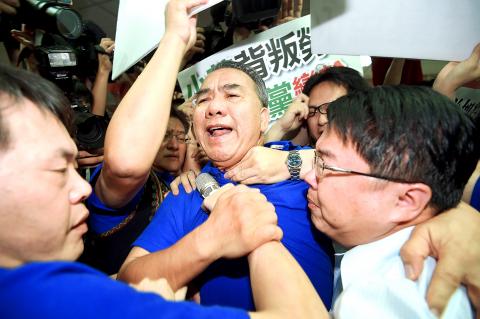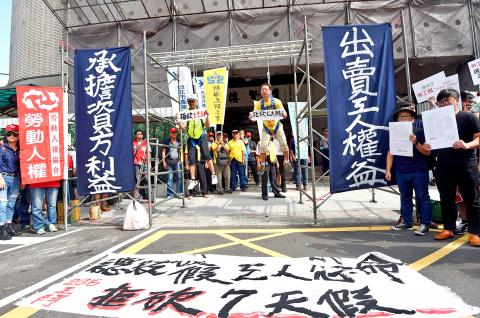Democratic Progressive Party (DPP) and Chinese Nationalist Party (KMT) lawmakers yesterday clashed over a proposed amendment to the Labor Standards Act (勞動基準法) during a meeting of the legislature’s Social Welfare and Environmental Hygiene Committee presided over by DPP Legislator Chen Ying (陳瑩), who rushed through the proceedings and declared the review concluded in less than two minutes.
The DPP caucus called for a review of the proposed amendment that involves the controversial “one fixed day off and one flexible rest day” in every seven working days.
No other caucuses agree with the proposal and are calling for “two fixed days off.”

Photo: Fang Pin-chao, Taipei Times
The difference between “rest day” and “fixed day off” is whether employers are allowed to ask employees to work overtime on fixed days off; they can under the flexible rest day off policy.
DPP and KMT lawmakers started the tug-of-war on Tuesday night, with KMT lawmakers occupying the room that is usually used for Social Welfare and Environmental Hygiene Committee meetings. DPP lawmakers changed the meeting room and then occupied it.
About half an hour before the scheduled 9am start time for the meeting, KMT lawmakers arrived at the new meeting room chanting: “The DPP is forcing through [the amendment] and [President] Tsai [Ing-wen (蔡英文)] has betrayed workers.”

Photo: Chien Jung-fong, Taipei Times
The room soon plunged into chaos, with DPP and KMT lawmakers scuffling, while dozens of camera crews filmed the melee. A voice was heard calling for people to back down for fresh air.
KMT lawmakers held banners, shouted slogans and said that changing the location of the meeting was “against the law.”
KMT lawmakers called out the names of DPP lawmakers who have long been considered labor friendly, such as Chung Kung-chao (鍾孔炤) and Lin Shu-fen (林淑芬), and accused them of betraying and deceiving workers.
DPP lawmakers criticized the KMT in return, calling the party a “political chameleon.”
KMT lawmakers called for public hearings before the review.
Their DPP counterparts asked why the KMT did not arrange for public hearings when former committee coconvener KMT Legislator Alicia Wang (王育敏) chaired a meeting of the committee in July.
Both parties have accused the other of physical assaults during the brawl.
At 9am, Chen announced the start of the meeting. Legislative staff took 14 minutes to read through the amendment proposals, during which time lawmakers continued to quarrel.
At 9:14am, Chen, with a DPP majority, announced the end of the session, saying that the review was “complete” and referred the amendment to cross-caucus negotiations before the floor meeting when final reading takes place.
When Chen asked whether there was opposition to the decision she received mixed responses, but continued to pronounce the meeting’s end at 9:16am.
After the session KMT lawmakers said that Chen was a “runaway” chairwoman and that the meeting was illegitimate.
The KMT caucus held a news conference after DPP lawmakers left the session.
“That was a glorious battle for Tsai, but it was a miserable day for Taiwan’s 9 million workers,” KMT caucus secretary-general Johnny Chiang (江啟臣) said, adding that it was a betrayal of workers who have long supported the DPP.
KMT caucus convener Sufin Siluko (廖國棟) said Tsai’s directive to the DPP caucus that they ram through the amendment has made the administration a “centralized authority” and the Legislative Yuan a “legislative bureau,” adding that the KMT “stands firmly with workers and for their rights.”
KMT legislators labeled Chen’s actions a “shame for democracy” and called her “one-minute Ying,” in reference to “half-a-minute Chung,” a name given to former KMT legislator Chang Ching-chung (張慶忠), who tried to push through the cross-strait service trade agreement in 30 seconds and helped sparked the 2014 Sunflower movement.
In a post-meeting news conference, the DPP caucus reiterated the validity and procedural integrity of the committee meeting.
DPP caucus chief executive Wu Ping-jui (吳秉叡) said Chen’s actions were different from those of Chang’s, which were not in accordance with meeting procedures.
Chen conducted the meeting according to procedure and the meeting was recorded in its entirety, Wu said.
Asked by reporters why she did not respond to KMT legislators’ request to discuss the bill when she announced the completion of the review and asked for objections, Chen said she could not hear KMT lawmakers as the meeting room was too loud.
Additional Reporting by Chen Wei-han

EUROPEAN TARGETS: The planned Munich center would support TSMC’s European customers to design high-performance, energy-efficient chips, an executive said Taiwan Semiconductor Manufacturing Co (TSMC, 台積電), the world’s largest contract chipmaker, yesterday said that it plans to launch a new research-and-development (R&D) center in Munich, Germany, next quarter to assist customers with chip design. TSMC Europe president Paul de Bot made the announcement during a technology symposium in Amsterdam on Tuesday, the chipmaker said. The new Munich center would be the firm’s first chip designing center in Europe, it said. The chipmaker has set up a major R&D center at its base of operations in Hsinchu and plans to create a new one in the US to provide services for major US customers,

The Ministry of Transportation and Communications yesterday said that it would redesign the written portion of the driver’s license exam to make it more rigorous. “We hope that the exam can assess drivers’ understanding of traffic rules, particularly those who take the driver’s license test for the first time. In the past, drivers only needed to cram a book of test questions to pass the written exam,” Minister of Transportation and Communications Chen Shih-kai (陳世凱) told a news conference at the Taoyuan Motor Vehicle Office. “In the future, they would not be able to pass the test unless they study traffic regulations

GAINING STEAM: The scheme initially failed to gather much attention, with only 188 cards issued in its first year, but gained popularity amid the COVID-19 pandemic Applications for the Employment Gold Card have increased in the past few years, with the card having been issued to a total of 13,191 people from 101 countries since its introduction in 2018, the National Development Council (NDC) said yesterday. Those who have received the card have included celebrities, such as former NBA star Dwight Howard and Australian-South Korean cheerleader Dahye Lee, the NDC said. The four-in-one Employment Gold Card combines a work permit, resident visa, Alien Resident Certificate (ARC) and re-entry permit. It was first introduced in February 2018 through the Act Governing Recruitment and Employment of Foreign Professionals (外國專業人才延攬及雇用法),

‘A SURVIVAL QUESTION’: US officials have been urging the opposition KMT and TPP not to block defense spending, especially the special defense budget, an official said The US plans to ramp up weapons sales to Taiwan to a level exceeding US President Donald Trump’s first term as part of an effort to deter China as it intensifies military pressure on the nation, two US officials said on condition of anonymity. If US arms sales do accelerate, it could ease worries about the extent of Trump’s commitment to Taiwan. It would also add new friction to the tense US-China relationship. The officials said they expect US approvals for weapons sales to Taiwan over the next four years to surpass those in Trump’s first term, with one of them saying